Noun ExamplesIn most dialects, particularly English, nouns are the most common word type. A noun is a term that relates to an object (Pen), a person (Lisa Jacob), animal (Dog), place (Dubai), quality (softness), idea (justice), or action (Singing). It's basically a single term, though not always: nouns include cake, shoes, the school bus, and an hour and a half. A person, location, or object, to put it simply. Following are some examples: A person: a boy, a lady, a schoolteacher, Peter, and Elizabeth A location: house, workplace, city, farmland, and America Thing: a chair, a bike, a mango, money, music, love, a puppy, and a chimpanzee 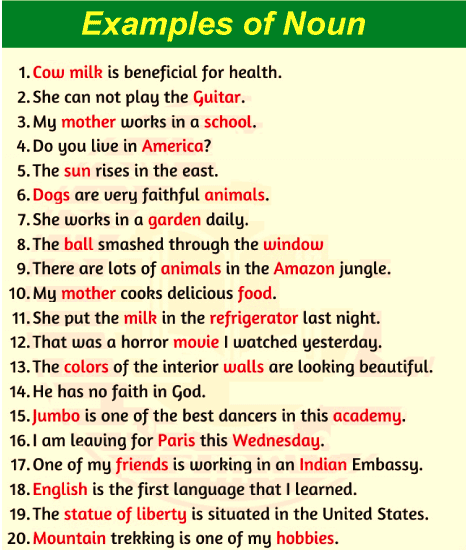
Some noun examples include;
It should be noted that any of the preceding can also be alluded to using a pronoun. Also, names like Johnny or United States are referred to as "proper nouns. Nouns are classified into several groups. 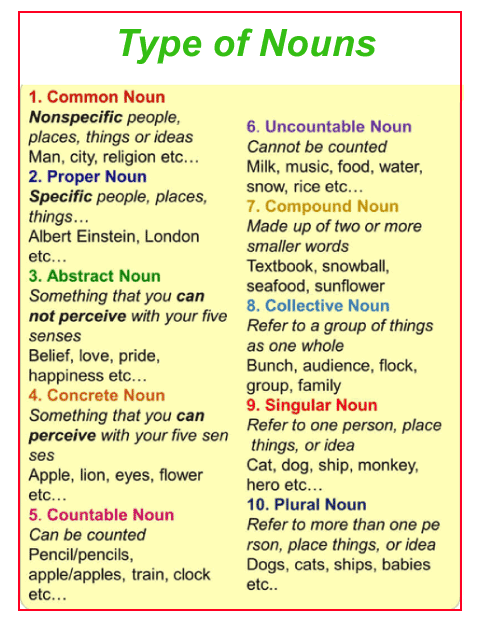
There are various types of nouns: Common Noun And Proper NounA common noun is a word that represents an individual, location, or object but is not the name of that individual, location, or object. Animals, sunlight, and happiness are among some common noun examples
A proper noun is the name of a particular individual, location, or object; it is usually preceded by a capital letter: Benjamin Franklin, Brazil, and Korean War are all proper nouns. Here are a few proper noun examples
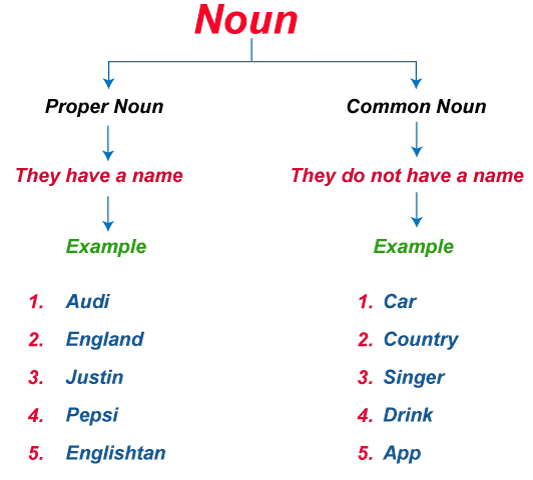
Concrete NounConcrete nouns reflect a genuine and physical thing: piglet, individual, stone, fragrance, wind, dish, David are all concrete nouns. Examples of concrete nouns include a glass, a laptop, a gemstone, a racetrack, soap, and Sandra. Concrete noun examples are outlined in the following texts for easy recognition.
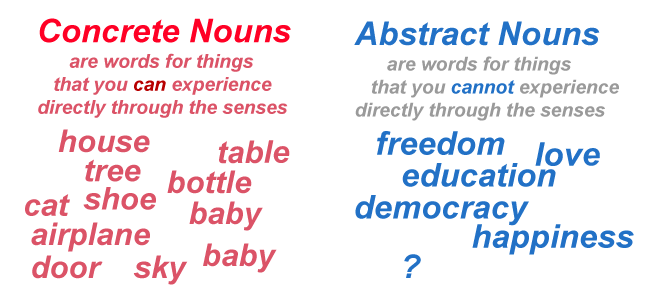
Abstract NounAn abstract noun implies to anything that is more akin to a notion or idea. These are the things you can't see with your five human senses. Noun Examples include love, morality, democracy, compassion, beauty, and wisdom, all abstract nouns. The examples of abstract nouns in the following statements are highlighted for clear identification.
Countable and Uncountable NounsNouns can also be categorized as countable or uncountable. 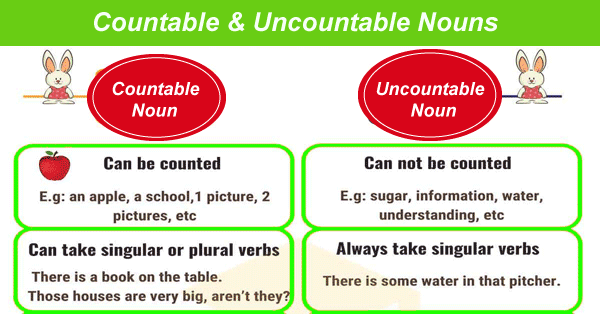
A countable noun is something that can be counted or tallied, such as an airplane, a stocking, a cup, a macaroni, or a professor, as in two airplanes, three stockings, and 1000 macaroni. Countable noun examples: sweet-tart, cheetah, blouse, lens The instances of countable nouns in the following sentences are highlighted for easy identification.
Tons is a countable term in the above-mentioned examples, but coal is not. Coal is classified as an uncountable noun. Water, music, clothes, and understanding are examples of uncountable nouns that can have a quantity or number yet cannot be measured. Numerous noun examples include hatred, trust, attractiveness, and intelligence. The examples of uncountable nouns in the following statements are highlighted for easy recognition.
Collective Noun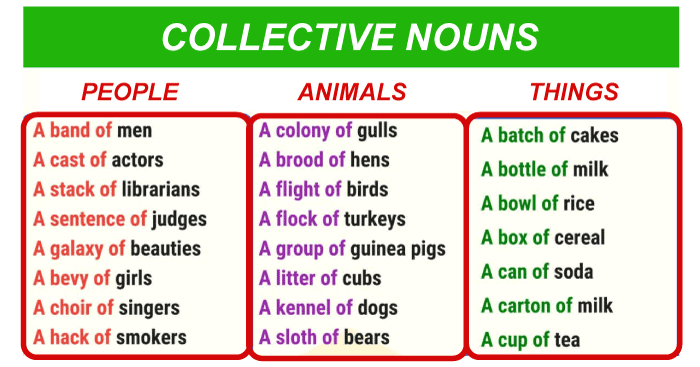
Collective nouns refer to a group of individuals or objects, such as a crowd, a squad, a batch, a clan, or a classroom. Westerners regard collective noun to be singular and use singular verb with these, such like the group enthusiastically sings. When addressing British English, both singular and plural verbs may be employed, as in the squad sings enthusiastically before the audience. Collective noun examples: govt, jury, squad, bunch, classroom, class, and chamber (the folks in the house or building) These noun examples have been given in the following sentences and are highlighted for easy recognition.
Compound Noun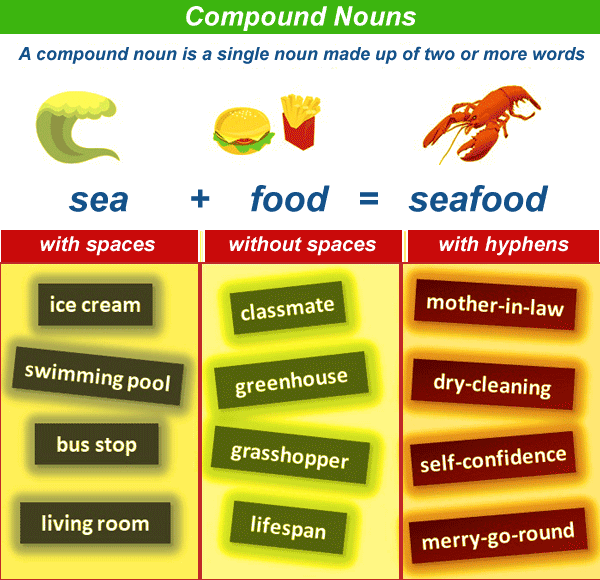
Every compound noun comprises two or more terms that are combined to make a noun. A compound noun might be a common noun (for example, fish skewers), a proper noun (for example, Pizza Hut), or an abstract term (lovesickness). These distinct words do not have to be nouns in and of themselves; all they need to do is express a particular individual, location, concept, or object. Let us have a look at the noun examples for a better understanding.
Material Noun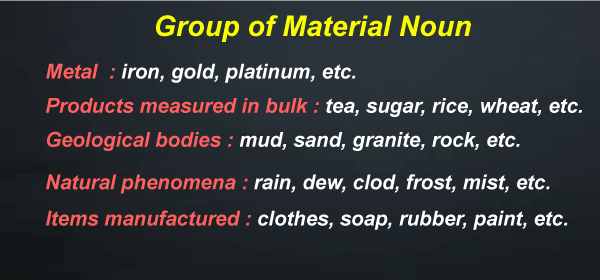
A material noun is a grammatical word that implies a specific substance out of which something is formed, such as gold, platinum, steel, cotton, diamonds, and plastics. A material noun is a term about anything that is physical. "Protein" is an instance of a material noun in the phrase "Protein is essential for vitality." Now let us have a look at a few of the noun examples for better understanding.
Singular NounThis noun is one which does not have a plural term and always contains determiners like 'a' or 'the' in front of them, such as 'standstill' or 'surroundings.' A singular noun hence implies to only one or a single item, location, individual, or concept. A singular noun cannot represent a large number of individuals, locations, things, or ideas. Singular nouns include things like man, lady, instructor, boat, horse, hand, and so on. Now let us have a look at these noun examples for better understanding.
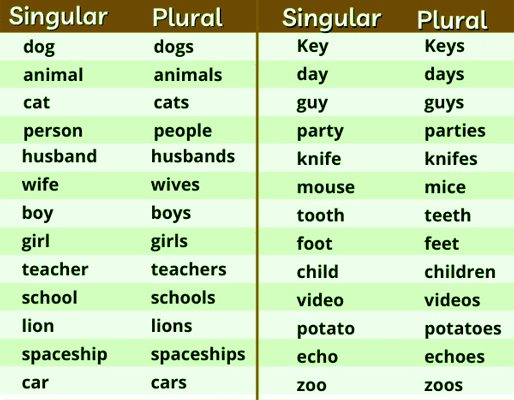
Plural NounA plural noun is a word that implies to the presence of more than one individual, animal, location, item, or concept. When writing about more than one of something, you normally use the same term, just with addition of an s, es, or ies at the end. There are some exceptional cases, but they are few and far between. One of the best is that a singular moose is still a moose, and a group of moose is also a moose. Noun Examples: dogs, beaches, fungi, feet, clothes
Possessive Nouns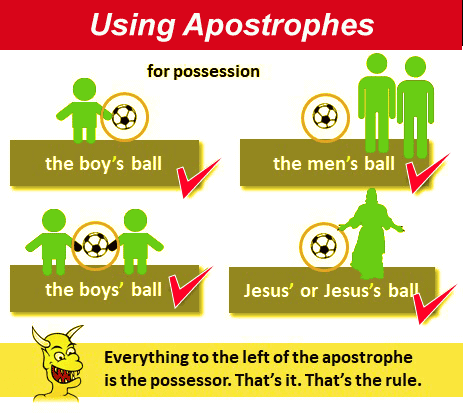
Possessive nouns indicate that a person, place, or object owns something. They usually finish with "s," like plural nouns, but possessive nouns contain an apostrophe just before "s." Find or search for an apostrophe to help you find them. Meena's mind took flight as she remembered about her trip to Maldives. Kerala's scenery is absolutely stunning. Nouns in the sentencesTry taking a look at these sample sentences comprising several nouns according to the above noun categories to acquire a better understanding of these varied noun examples. The nouns are underlined in bold (some sentences include more than one noun, but we've emphasized just one to keep things easy).
Next TopicProper Noun
|
 For Videos Join Our Youtube Channel: Join Now
For Videos Join Our Youtube Channel: Join Now
Feedback
- Send your Feedback to [email protected]
Help Others, Please Share










